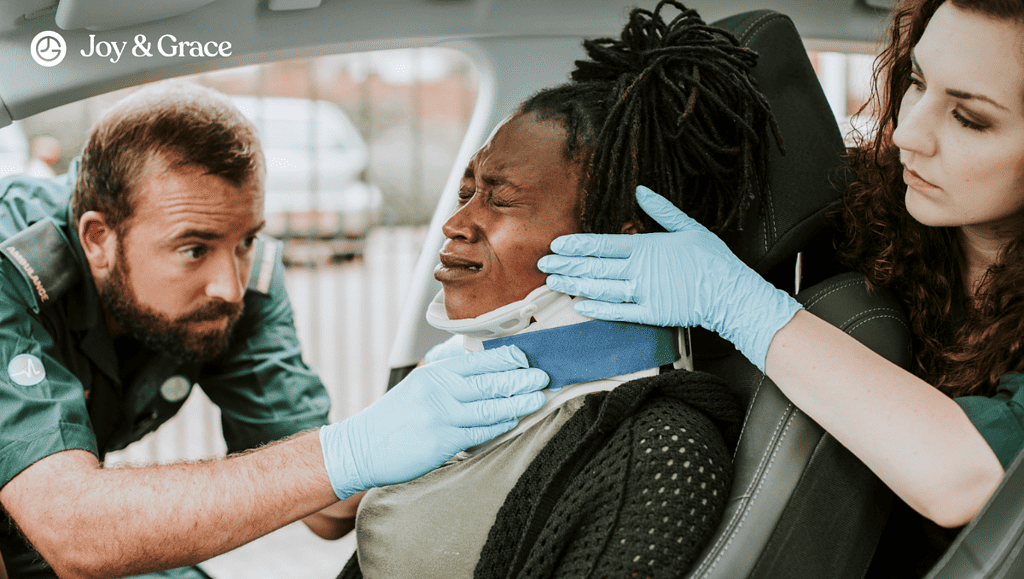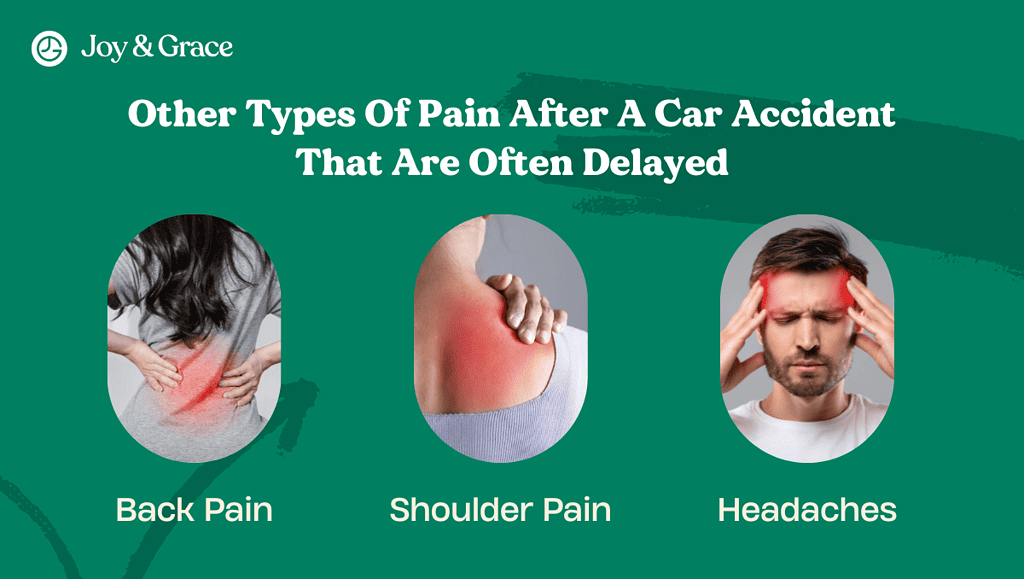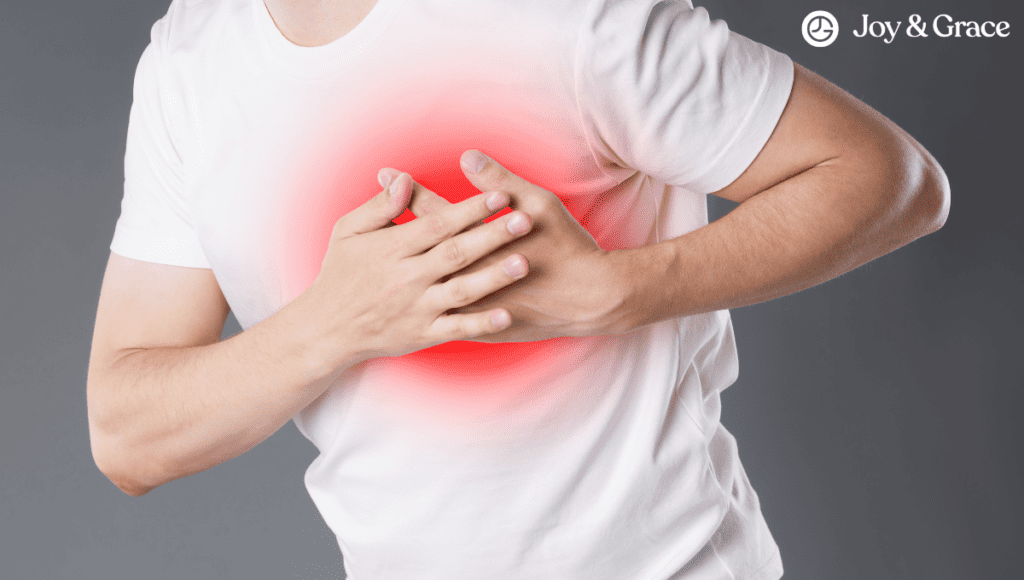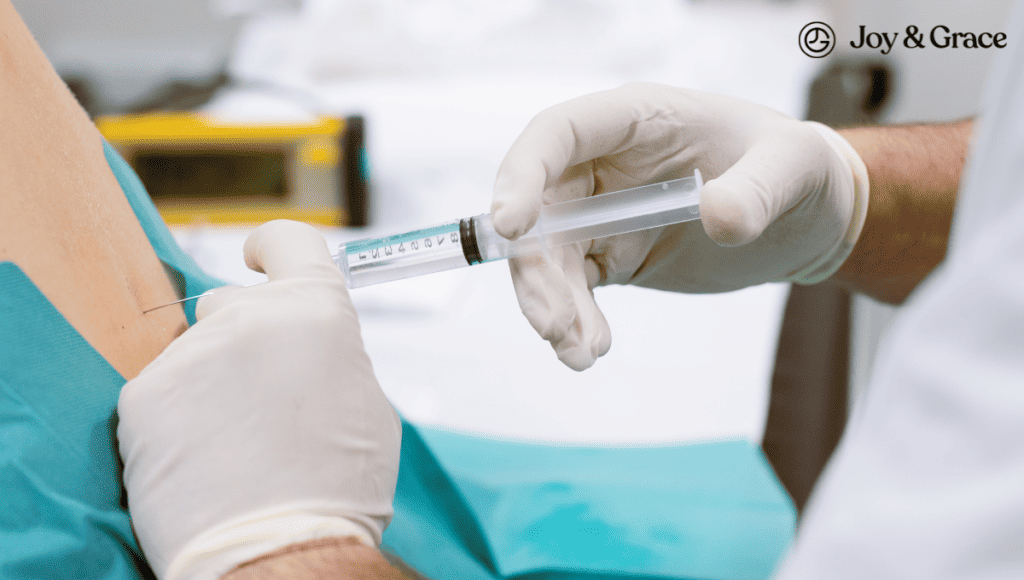Car accidents are common incidents that can lead to neck, back, and shoulder pain. While some experience pain right after the accident or fall, others may not feel any discomfort until several hours or days later. Delayed neck and shoulder pain can be debilitating, leading to restricted mobility and reduced quality of life.
In this article, we’ll explore the causes and symptoms of delayed neck pain after a car accident. We’ll also highlight some ways you can manage and ease the pain associated with these incidents.
Can You Have Delayed Neck Pain After A Car Accident?

Car accidents can be frightening experiences. They can leave you with injuries ranging from minor bruises to severe bone fractures. However, symptoms of the injury don’t always present immediately after the event. Sometimes, these injuries can take time to develop, and you may not even realize you're injured until a few days or even weeks have passed.
Delayed neck pain is common after a car accident, and various factors can cause it.
It can be caused by the sudden neck movement during the impact or by the jarring of the body. This is called whiplash and can result in strains or sprains to your neck muscles or other soft tissue structures.
Delayed neck pain after a car accident can also be due to a tear or injury in one of your neck arteries. This is called blunt traumatic vertebral artery injury (TVAI), and motor vehicle accidents are one of its major causes. This type of injury includes cervicocerebral artery dissection, which can also cause neck pain and may lead to a stroke.
Why Does Delayed Neck Pain Happen After A Car Accident?
If you're wondering why that fender bender from last week is still giving you pain, here are two (plus one) reasons why this can happen:
- Your body’s natural response
Our body's natural response to injury is often to release hormones called adrenaline and endorphins. These hormones can stop you from feeling pain. The problem is that this dynamic duo can make it challenging to realize how hurt we are.
So if you're feeling "fine" after an accident, remember that your body’s pain blockers might be pulling a fast one on you.
- The severity of the injury
The severity of the injury can affect when your symptoms appear. For example, a minor strain might not cause noticeable symptoms until several days after the incident, while a more severe injury could cause immediate symptoms.
- Unknown mechanisms
Some studies on whiplash injuries suggest that there may be an additional and unknown mechanism behind delayed pain in a set of patients. In these cases, the cause of neck pain after a car accident might not be just a simple sprain, according to researchers. Instead, they believe that the damage to the neck might be due to a unknown and slowly developing process.
How Long After A Car Accident Can Neck Pain Start?

The answer varies from person to person, but neck pain can develop anywhere from hours to days or even weeks after a collision. However, as previously mentioned, the exact mechanism of delayed neck pain remains unknown in some cases.
In a 2022 study, researchers found that in people who recovered within two years after the accident, the headache started about 10 hours later, and neck pain started about 11 hours later.
In the group of patients whose recovery took more than 2 years, the headache started about 4 hours later, and neck pain started about 8 hours later. However, the study also reported patients whose symptoms started several days after the initial injury.
Symptoms of traumatic vertebral artery injuries (TVAIs) can also appear over a wide range of time. According to studies, symptoms of TVAIs can occur right after an accident injury, or they might not show up until 3 to 6 months later. Interestingly, there are even cases where the delay in symptoms can be as long as 5 years.
In one more detailed case report, three patients did not develop any symptoms until more than a week after their motor vehicle accidents.
In another case, a 42-year-old woman went to the ER complaining of sweating and neck pain one month after her car accident. Upon examination, it was found that the arteries in her neck had narrowed, possibly due to the accident.
The bottom line is: There are great variations in how long it takes for neck pain to start after an accident. What’s important, however, is seeking medical attention when you experience pain, regardless of how delayed it may be after a collision or injury.
Signs Of Delayed Neck Injury After A Car Accident
Here are some common symptoms to look out for if you have recently been in a car accident:
- Soreness or neck pain ranging from a mild ache to more severe pain.
- Restricted range of motion or a stiff neck that can make it difficult to turn the head.
- Headaches, especially at the base of the skull or in the forehead.
- Numbness or tingling sensations in the arms, hands, or fingers.
- Weakness in the arms or hands, which may make it difficult to carry out everyday tasks.
- Dizziness or a spinning sensation (vertigo) that can affect balance and coordination.
- Blurred vision or ringing in the ears (tinnitus), which may be accompanied by light sensitivity or difficulty hearing.
You should also look out for other symptoms that may point to traumatic vertebral artery injuries:
- Slurred speech
- Loss of consciousness
How Long Does Neck Pain From A Car Accident Last?
Wondering how long that pesky neck pain from your car accident will stick around?
Well, according to some studies, it can either go away after 2-3 months or may become chronic.
Specifically, the data suggest that around 50% recover within the first 3 months, while the remaining 50% go on to develop chronic symptoms.
According to the same study, women have somewhat lower chances of full recovery. These chances also decrease by 14% with every decade of life.
A study with 2,627 participants found that women aged 60 took an average of 262 days to recover from whiplash. However, a study from Japan suggested different findings, with only 24.2% of women having symptoms for more than 3 months compared to 34.3% of men.
If the symptoms of whiplash last for more than 6 months, this is termed late whiplash syndrome. Late whiplash syndrome occurs in around 14 to 42% of people.
There may also be a psychological factor regarding how fast you can recover from whiplash. According to a study, those who had a positive outlook and expected a fast recovery recovered 3 times faster than those who didn’t.
Other Types Of Pain After A Car Accident That Are Often Delayed

Here are some common types of pain that are often delayed after a car accident:
- Back Pain
Back pain is another type of pain that can be delayed after a car accident. It can occur due to the impact of the collision, causing muscle strains&sprains or herniated intervertebral discs.
Symptoms of back pain may not appear until a few days after the accident and may include the following:
- Muscle spasms
- Difficulty standing up straight
- Shooting pain down the legs.
On the other hand, more severe spinal injuries, such as spinal fractures (broken bones in the spinal column) and spinal cord injuries, usually show symptoms right away. These types of injuries require immediate medical attention.
- Shoulder Pain
Pain due to shoulder injuries is also common after a car accident, especially if the seat belt was not properly fastened or if the collision caused the passenger to jerk suddenly to the side.
Symptoms may include:
- Pain with arm movement
- Weakness
- Difficulty raising your arms and lifting objects.
- Headaches
Headaches are another type of pain caused by a car accident that can appear weeks or months after the event. Headaches can be a symptom of whiplash, or they can also be a sign of a traumatic brain injury (TBI). A traumatic injury can be:
- A concussion which occurs when the brain is jolted or shaken inside the skull.
- A contusion or a bruise on the brain caused by a direct impact on the head.
- Internal bleeding within the brain
Headaches caused by TBI can range from mild to severe and usually appear right after the accident. They may be accompanied by other symptoms, such as:
- Dizziness
- Blurred vision
- Difficulty concentrating
Traumatic brain injuries are very serious, so if you have headaches after a car accident, seek medical attention right away.
What Do I Do If I Experience Delayed Neck Pain After A Car Accident?
If you are experiencing neck pain a week after a car accident, you may be wondering what steps you should take. Here are some things to keep in mind:
1. Seek medical attention.
Seeking medical attention as soon as possible is crucial, even if you don’t feel any pain.
A healthcare professional can properly diagnose your injuries and provide an appropriate treatment plan.
2. Follow your doctor's advice
Your doctor's advice may include the following:
- Rest
- Ice and heat therapy (Ice packs and heating pads are good options)
- Physical therapy
- Medication such as painkillers and muscle relaxants
- Chiropractic care
- Nerve blocks and surgery for severe cases
It's important to follow their advice to a tee to ensure the best possible outcome for your recovery.
3. Keep track of your symptoms.
Document any symptoms you experience after an accident, even if they don't appear immediately. This will be helpful for your doctor's evaluation and can assist in any legal matters that may arise.
Why Prompt Care Matters After A Car Crash
Seeking medical care after a car accident is crucial for many reasons.
As we mentioned, some injuries may not be immediately obvious. You may feel fine after an accident, only to wake up with neck or back pain the following day. This delayed onset can cause more damage in the long run and may require more intensive medical treatments.
Prompt medical attention after a car accident can also provide much-needed pain relief. Injuries such as neck and back pain can cause discomfort and negatively impact your daily routines. Receiving prompt medical attention can help ease the pain and discomfort, speeding up your road to recovery.
Finally, seeking prompt medical attention can help mitigate future medical expenses. Getting an accurate diagnosis after a car accident can help you determine the extent of your injuries and provide you with a clear recovery plan. This can help you avoid future complications and additional medical expenses.
Takeaway
If you experience any neck pain after a car accident, do not dismiss it as minor soreness. Seek medical attention immediately because the pain can appear days or weeks after the accident.
Delaying treatment for neck pain can lead to more severe conditions, such as chronic pain, nerve damage, and even strokes.
Remember, your health and well-being are top priorities. Don't ignore any neck pain, whether it appears immediately after an accident or days or weeks later.















